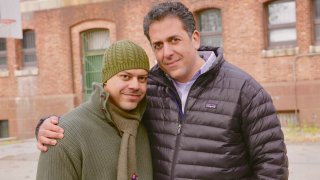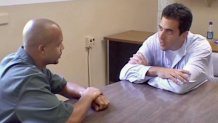
Dan Slepian was skeptical from the start.
In December of 2002, the longtime NBC News investigative producer received a letter from Jon-Adrian "JJ" Velazquez, a man serving a 25-years-to-life prison sentence for a crime he swears he did not commit. In the letter, Velazquez asks Slepian, whose reporting on the criminal justice system has helped exonerate several innocent people, to look into his case.
Slepian set out to prove Velazquez's guilt, but everything he found pointed toward his innocence.
In a new podcast from NBC News Studios — "Letters from Sing Sing" — Slepian takes listeners on his personal journey exploring the 1998 murder of retired NYPD officer Albert Ward.
Get a weekly recap of the latest San Francisco Bay Area housing news. Sign up for NBC Bay Area’s Housing Deconstructed newsletter.
Ward was killed at his illegal gambling business in Harlem during an apparent attempted robbery.
Slepian documents Velazquez’s quest for freedom with real-time recordings and exposes systemic breakdowns in the criminal justice system along the way.
And the case is still unfolding. In 2021, after more than 23 years behind bars at Sing Sing Correctional Facility in Ossining, New York, Velazquez was granted clemency by then-New York Governor Andrew Cuomo. Despite President Joe Biden apologizing to Velazquez "on behalf of all society" at a presidential forum last October, Velazquez has yet to be exonerated.
Entertainment News
Slepian spoke with NBC about his relationship with Velazquez and some key moments in his investigation.
Slepian’s responses have been edited for length and clarity.
Could you describe the moment you first met JJ Velazquez's mother and children at Sing Sing?
It was Thanksgiving Day of 2002. I was working on another story of a man who was wrongfully convicted of a murder that happened on Thanksgiving Day in 1990, so I was filming that guy's mother outside the prison.
JJ's mom and this guy's mom knew each other because the guy in prison and JJ knew each other. JJ told his mom to wait for me. When I walked into the lobby, this woman was standing there holding the hands of these two little boys. I'll never forget it. The older one was to her waist on her right side. The younger one was on her left, just below her waist — he was four or five years old. He had these huge eyes looking up at me, and there was this sadness on his face.
His mom said, 'My son is innocent. Can you help us?' I had no idea what her son's name was, but I will never forget looking into that little boy's eyes, thinking, 'Even if his dad is guilty, this little boy should not be in a prison on Thanksgiving morning.' And that touched me in a sense. I was thinking about becoming a father myself around that time.
You first heard from Velazquez himself through a letter. Why was that letter significant, and what made it different from other communication you’ve received from people behind bars claiming they're innocent and asking for help?
The letter itself, in the beginning, was just another letter from somebody incarcerated who was claiming that they were innocent. But what was different about this letter was how it was written. Usually, I get letters from people in prison that are a little bit all over the place, maybe through no fault of their own.
This letter was written like a lawyer had written it. It was meticulous. It was thorough. It was direct. It was specific. He wrote, ‘My trial transcript is 2,044 pages, and I think you only have 1,689 pages of it.’ That letter sparked a 20-year journey that I could have never imagined, both personally with him and my deep dive into the abyss of what it means to be wrongfully convicted in America when you’re trying to get out.

How did your relationship with Velazquez develop over time? In the first episode, you stress the importance of honesty. Did you and Velazquez have a good foundation of trust?
Honesty is the key to our relationship. I was incredibly skeptical of JJ’s innocence for a long time because I had just been working on another innocence case, and I thought it was one in a million. When I met JJ, police and prosecutors were saying five eyewitnesses had picked him out — that’s a big hill to overcome. It was a strictly and purely professional relationship between a journalist and a subject claiming he was innocent.
Everything changed around 12 or 13 years into knowing him when I saw how people who were in the system were treating the investigation of his case in a way that wasn’t truly fair and objective. He had written me a letter 12 years after he wrote me his first letter when an appeal was denied, and he said, ‘It is with great regret that I must sit here at this lonely hour and inform you that justice has no place in my life.’
It was the first time in my 28-year career at NBC that I had to make a decision: do I keep fighting for what I think is right, or do I just let the system play out the way it’s going to play out? JJ is such an exceptional human being, and I believed he was an innocent man, so I felt a human moral obligation not to abandon him.
You were very skeptical. When was the first moment you realized he did not receive a fair investigation?
I always default to guilt. I always default to the DA's office. If I had to pick one moment that I was like, 'OK, there's something wrong here,' it's when I interviewed the key eyewitness to the crime — the person that brought JJ into the case.
He was a heroin dealer who was picked up two days after the crime. He described the shooter as a Black man. JJ is Puerto Rican. He had ten bags of heroin on the table in front of him in the police station. He was questioned for hours, looked at 1,800 mug shots and eventually picked out JJ. He was allowed to leave the precinct with his heroin.
When I interviewed him 10 years after the conviction, he basically told me he picked JJ out randomly because he was scared and wanted to get out of the precinct. When a guy who looks nothing like the description of the shooter becomes your suspect, everything after that is questionable.
Why was it important for you to have a relationship with Velazquez’s mother and kids?
When you’re in prison, it’s not just you being affected. It’s your children, your parents, your cousins and your community. There’s this ripple effect of incarceration. That’s true for everyone, whether you’re guilty or innocent.
But when you’re innocent, there’s an elevated level of emotionality and despair. For so many years, I watched JJ’s mother suffer. JJ is her only son. When I came to my own moral certainty that he was innocent, I felt compelled to continue a relationship with her to let her know that I would stay with this, whether it was in the act of journalism or an act of friendship. I thought seeing what a mother has to go through was an important part of the story.
I met his kids when they were eight and five. They’re now 28 and 25. I’ve known them for 20 years. When his older son was 16, I was there when he got out of his first halfway house. In his twenties, he went to prison for two years. JJ predicted what would happen because there’s this cycle of incarceration — it’s not just JJ. I wanted to follow that other part of the story to show the consequences of wrongful conviction and incarceration on all families.

What is the main takeaway from this story?
This is more than just a wrongful conviction story. If you have a post-conviction claim of innocence with merit, you need a bolt of lightning to strike the jailhouse door, even to have a chance of having your case heard again. It's an epidemic. There are at least tens of thousands of people blocked away from their families and are living in a cell for something they did not do.
If you have a post-conviction claim of innocence with merit, you need a bolt of lightning to strike the jailhouse door, even to have a chance of having your case heard again.
Dan Slepian
If the system is 95% right, that means there are 100,000 innocent people in prison today. Yet, in over 30 years, just over 3,000 people have been exonerated. Why? Because the system isn't built to get people out. It's built to put them in and keep them in.
A couple of months ago, the president of the United States sat across from JJ in the White House and apologized to him 'on behalf of society.' As we sit here today, JJ has a curfew because he's under parole. He needs papers from the parole office just to cross state lines. He's still not vindicated. What does it take?
You can listen to “Letters from Sing Sing” now, wherever you get your podcasts. New episodes will drop every Monday through March 27, 2023.



